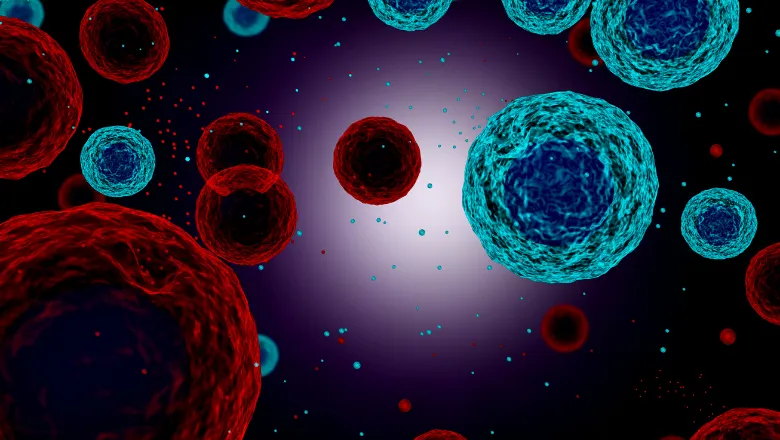This is a pioneering study validating PAK4 using RNAi as an effective and novel therapeutic target for pancreatic cancer in vivo. The findings suggest an exciting potential of siRNA-loaded pancreatic-derived exosomes in pancreatic targeting, paving the way for promising and more efficacious treatments for pancreatic cancer.
Professor Khuloud Al-Jamal, School of Cancer & Pharmaceutical Sciences
17 September 2020
Researchers find novel treatment strategy for pancreatic cancer in cross-discipline collaborative study
A new cross-discipline collaborative study presents a novel treatment strategy for pancreatic cancer providing hope for next generation cancer treatment.

Pancreatic cancer remains one of the most aggressive and devastating malignancies, predominantly due to the absence of a valid biomarker for early diagnosis and limited therapeutic options for advanced cases.
The Al-Jamal laboratory located in the School of Cancer & Pharmaceutical Sciences at King’s, led by Professor Khuloud Al-Jamal, is specialised in the pre-clinical translation of nanomedicines for drug delivery, imaging and diagnosis of cancer and central nervous system disorders. The group have gained interest in developing exosomes – vesicles that shuttle proteins and genetic information between cells – as nanocarriers for drug delivery applications over the past five years and their research outcomes have resulted in a track record of publications in exosomes research.
The Wells laboratory, also located in the School of Cancer & Pharmaceutical Sciences and led by Dr Claire Wells, is interested in cancer cell migration, adhesion and invasion and their work specifically investigates the roles of P21-activated kinase (PAK4) – an enzyme found at particularly high levels in pancreatic cancer cells that plays a key role enabling cancer cells to grow and spread to other areas of the body.
This current study, a collaboration between both laboratories and primarily conducted by Dr Lizhou Xu, presents a novel treatment strategy for pancreatic cancer by delivering therapeutic RNA specifically targeting PAK4 using exosomes produced by the same pancreatic cancer cells cultured in laboratories. Researchers found that the proposed treatment significantly controlled tumour growth and successfully prolonged survival, without causing noticeable adverse effects, suggesting an exciting clinical potential of exosome delivery of RNA against PAK4 in treating pancreatic cancer.
Given the promising results presented, the researchers note that scaling up production for exploration of the efficacy of this delivery system and therapeutic modality for systemic administration constitutes is important future work.
Additional studies are still required to be able to understand siRNA delivery mechanisms offered by exosomes. This will pave the way for new strategies to be implemented to further their potency as carriers for nucleic acids. Collectively, there is a great potential in the therapeutic use of cancer-derived exosomes for next generation cancer treatment.
This was a fantastic collaboration with Dr. Al-Jamal – I am delighted that we were able to combine our different scientific backgrounds in such an effective way – I look forward to working together in the future.
Dr Claire Wells, School of Cancer & Pharmaceutical Sciences
View the paper titled “Exosome-mediated RNAi of PAK4 prolongs survival of pancreatic cancer mouse model after loco-regional treatment” in Biomaterials.


